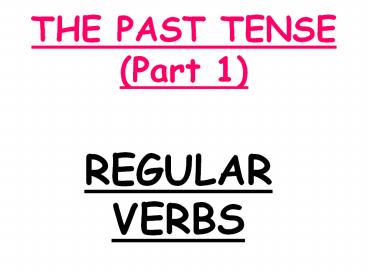THE PAST TENSE (Part 1) - PowerPoint PPT Presentation
Title:
THE PAST TENSE (Part 1)
Description:
Title: The Perfect Tense in German Author: mfllogin Last modified by: Rebecca Hauseman Created Date: 11/29/2006 7:07:59 PM Document presentation format – PowerPoint PPT presentation
Number of Views:132
Avg rating:3.0/5.0
Title: THE PAST TENSE (Part 1)
1
THE PAST TENSE (Part 1)
- REGULAR VERBS
2
We use this tense, when talking about things that
have happened in the past. It is actually called
the Perfect Tense in German. First lets check
we remember the Present Tense.
3
Present Tense
- I play football
- Ich spiele Fussball
- He is doing English
- Er macht Englisch
4
- We are eating chips
- Wir essen Pommes
- They are drinking coke
- Sie trinken Cola
5
Changing from Present into Past
- The big difference between present and past is
that you need two verbs (doing words) instead of
one. - These two verbs are
- 1) a part of the verb haben to have or
sein to be - 2) a past participle
6
Haben and Sein
- You should already know how to use these two
verbs. You have been using them since the start
of the course. - Lets have a look at the two verbs.
7
haben to have
- ich habe
- du hast
- er hat
- sie hat
- es hat
- ihr habt
- wir haben
- Sie haben
- sie haben
- I have
- you (friendly) have
- he has
- she has
- it has
- you (plural) have
- we have
- you have (polite)
- they have
8
sein to be
- I am
- You (friendly) are
- he is
- she is
- it is
- you (plural) are
- we are
- you (polite) are
- they are
- ich bin
- du bist
- er ist
- sie ist
- es ist
- ihr seid
- wir sind
- Sie sind
- sie sind
9
How do we know when to use haben or sein?
- Most verbs use haben.
- A small group use sein and they are almost all to
do with MOVING. - E.g gehen, fahren, fliegen etc..
10
- WHAT IS A PAST PARTICIPLE?
- It is like ed in English
- E.g played, lived
11
HOW DO WE MAKE THE PAST PARTICIPLE?
- Take the infinitive
- and cross off the en
spielen
12
2. Then add ge....t
Ich habe Tennis gespielt.
13
hören
Ich habe Musik gehört
14
wohnen
Ich habe in England gewohnt
15
- This is how it works to make Past Partciple for a
REGULAR verb. - Of course there are loads of IRREGULAR Past
Partciples, which we will learn about later.
16
Using this rule, what would the past participle
of these regular verbs be?
- haben gehabt (had)
- kaufen gekauft (bought)
- spielen gespielt (played)
- tanzen getanzt (danced)
- sagen gesagt (said
- machen gemacht (did)
17
To sum up
- All verbs go with haben except those which
involve moving (e.g. to go) which go with sein. - The right bit of haben or sein goes at the START
of the sentence, next to the person doing the
verb (I, you, he etc..) - 3. The past participle always goes at the END of
the sentence
18
Ich habe Rugby gespielt
Ich habe Tischtennis gespielt
Ich habe Fussball gespielt
Ich habe Basketball gespielt
Ich habe Musik gehört
Ich habe getanzt
19
- How would you say these sentences?
- Have a go!
20
Homework
she
we
they
he
er hat Rugby gespielt sie hat Fussball
gespielt wir haben Hausaufgaben gemacht sie haben
Tischtennis gespielt
- (HELP!)
- Ich habe
- Du hast
- Er/sie/es hat
- Ihr habt
- Wir haben
- Sie haben
- sie haben
21
he
she
they
we
sie haben Basketball gespielt er hat Musik
gehört wir haben Tischtennis gespielt sie hat
getanzt























![Perfect tense\perfect-avoir-etre[2] PowerPoint PPT Presentation](https://s3.amazonaws.com/images.powershow.com/3672468.th0.jpg?_=20190918082)







